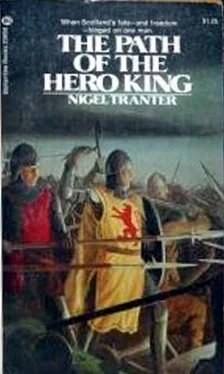Raid from there. And build up our strength.
Thank God for that, at least! Edward commented.
Let us be on our way, then.
First, a word or two might not be wasted, here, Bruce said. He nodded towards the castle. He handed his horn to Hay.
Blow it loud and long, Gilbert, he directed, and strode forward, near to the ditchs edge.
When the curious moaning notes of the horn died away, the King raised his voice.
Ho-the castle! he shouted.
Do all sleep sound in Tumberry this night?
A voice answered him from the gatehouse parapet promptly enough.
Who is there? Who dares come knocking at my lord of Northumberlands door, at this hour?
One who has a better right to that door than Henry Percy! Get him, man. I would speak with him.
Fool! Watch your words. Do you not know that this is the seat of His Majestys Governor here? Sheriff of Ayr?
You have your Majesties awry, fellow! Tell your lord that Robert Bruce, King of Scots, whose territory he defiles, whose castle he usurps, demands his ear; And quickly.
TOO
There was silence from the gatehouse. But quite soon another and thinner voice spoke-proof that the Percy had been in fact standing by.
Henry Percy speaks, my lord of Carrick, it said.
What folly is this? Where have you come from?
Costly folly for you and your like, Percy. As you will find out.
And the Earl of Carrick is now my brother, here. Mind it. Also, he is Sheriff of Ayr. I require your surrender of my castle of Tumberry forthwith. Yield it, and you shall go unharmed. Carrying my message to your master at Lanercost. That I require my kingdom at his bloodstained hands. And my wife also! Before every Englishman in Scotland dies the death of yours!
They could almost hear Percy choking.
Are you out of your wits, Bruce? he demanded, with difficulty.
Have your hurts, your defeats, turned your head? By morning, my men will have you cut to pieces …
Your men are all dead, Percy. Every one. They will not come to your aid. At the Castleton. The Kirkton. The stables. The brewery.
Maidens Mill. And the rest. All dead. Cleansed. As all Scotland will be, one day. That message you will take to Edward Plantagenet.
There was no response from the castle now.
Will you yield, then? And save your life?
No. Though that was hoarse, it was definite enough.
Very well. You will regret it. I will find another messenger for Edward. Hide you there in my castle, Percy. I do not choose to destroy my own house, where I was born. But … your days are numbered. If I were you, my lord-which God forbid! — I would slip out of that postern, to the beach, while the dark is still kind to you. And take boat across Solway to your English shore. For they say you are a cautious man.
No word answered that.
Ordering Hay to sound a derisory blast on the horn to indicate that the King of Scots had spoken the last word, Bruce turned to Lennox.
Keep your men here, in view from the castle, until I send for them.
Then take forty, and back to the boats. Sail for Arran.
Meantime, we go collect our booty. Horses. Food. Armour. Dead mens weapons. An hour should be sufficient. Then we head for the hills of Doon and Minnoch. He grasped the earls hand.
Bring me more Islesmen and Irish, Malcolm, so soon as you may. I shall need every one. And God go with you.
And with Your Grace Chapter Seven
Robert Bruce surveyed this his handiwork, at least, with some satisfaction-however otherwise his general frame of mind. The stag was a noble one, of ten points, and for the end of a long winter, moderately plump-which was not unimportant, with a score of men waiting to feed on it. And they were unlikely to get another that day. His arrow had taken it through the throat-even though he had aimed for the heart; but then, he was unused to these English long-bows and their cloth-yard shafts, purloined from the brewery at Tumberry. The Scots used much shorter and handier bows, if with correspondingly shorter range and less hitting-power.
Still, none need know that he had aimed at the heart and hit a good eight inches to the left, since the stag was as dead one way as the other. At least he had done better than Gibbie Hay, who had missed his mark altogether.
Kneeling, he drew his dirk to blood the beast by cutting the jugular vein. They would have to cut it all up, as well as gralloch it, for the brute would weigh fourteen or fifteen stone at least, he calculated, requiring three men to carry it the couple of miles back to their cave. He might as well play the butcher now, while he waited for the others to come up.
Bruce had killed, eventually, in the narrows of a small side glen at the foot of Loch Doon, in the wild mountain country where Ayrshire rose to the Galloway border, under mighty Merrick, Where they had spent the two weeks since Turnberry. Using his remaining score of Islesmen almost as hounds, he and Gilbert Hay had managed to have the three deer they had spied manoeuvred through the close country of steep hillsides, waterfalls, bogs and hanging woods, towards this trap of a narrow glen, the cater ans spread out in a great semi-circle to windward, closing in to give the beasts just enough of their scent to make them uneasy and moving in the other direction, without alarming them so that they bolted off at speed. This was a tactic which Bruce had learned in Christinas Moidart, and very different from the traditional southern method of hunting deer on horseback. The two marksmen had waited in the throat of the glen for the stags to drift within bowshot.
The two younger beasts had in fact bolted off at a tangent, uphill, long before they were in range; but this heavier animal had come on, by fits and starts, into the trap, disdaining to be flushed and flurried. Bruce had seen Hay, from a somewhat higher position than his own, across the glen, shoot and obviously miss. His own shaft, of a minute later, at fully ninety paces, was, all things considered, commendable enough.
He was bending over to make the first belly cut of the gralloch when, out of the corner of his eye, he glimpsed movement. Across the glen, and up. It was Hay, standing and waving. And not the congratulatory waving of one hunter to another; an urgent beckoning, rather.
The King straightened up. Hay was no excitable enthusiast, to gesture to his monarch like that, without due cause. As the other continued to beckon, Bruce wiped his red blade on the stags shaggy mane, sheathed it, and rose.
Company, Sire, Hay called softly, at his approach, and pointed.
From this position it was possible to see down the main valley of the Doon below the loch-foot. And coming up the riverside track, less than a mile away, was a mounted party of about forty, arms and armour gleaming in the last rays of the sinking wintry sun.
Bruce rubbed his bearded chin.
Men-at-arms, he said.
I
cannot think that they come to this remote wilderness looking for other than ourselves. Yet too small a company to be English sent to take us, surely. I believe they must be our first supporters, Gibbie!
And not before time, Sire! Hay observed grimly.
That was hardly an unfair comment. Despite the stirring activities of the night at Turnberry two weeks before, no upsurge of support had materialised for the King of Scots, whatever might be the glee at Percys discomfiture. No rallying to Bruces standard had developed, even amongst his own feudal vassals of Carrick and Kyle. After waiting for ten days in these hills, he had been forced to the recognition that more positive recruiting was necessary, and had sent out his lieutenants, each with about four-score Islesmen, to try to raise fighting men. Edward had gone south, to the great Bruce lordship of Annandale; Campbell southwest into Galloway, to try to link up with the other two Bruce brothers; Douglas northeast to Douglasdale and the Moray lordship of Bothwell.
Читать дальше












